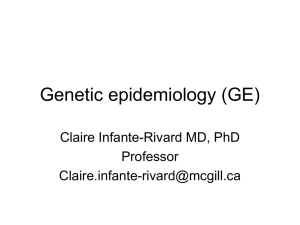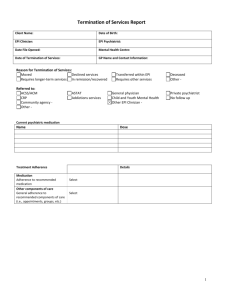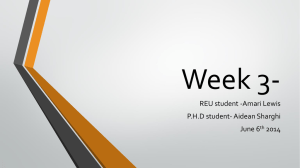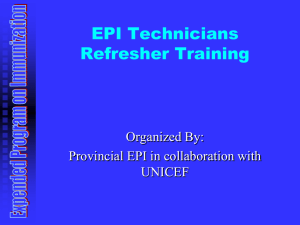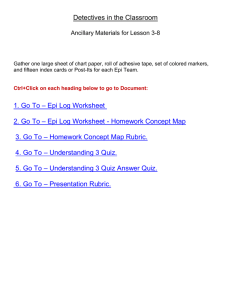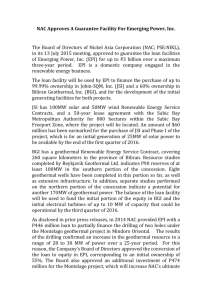Discussion Group Responses
advertisement
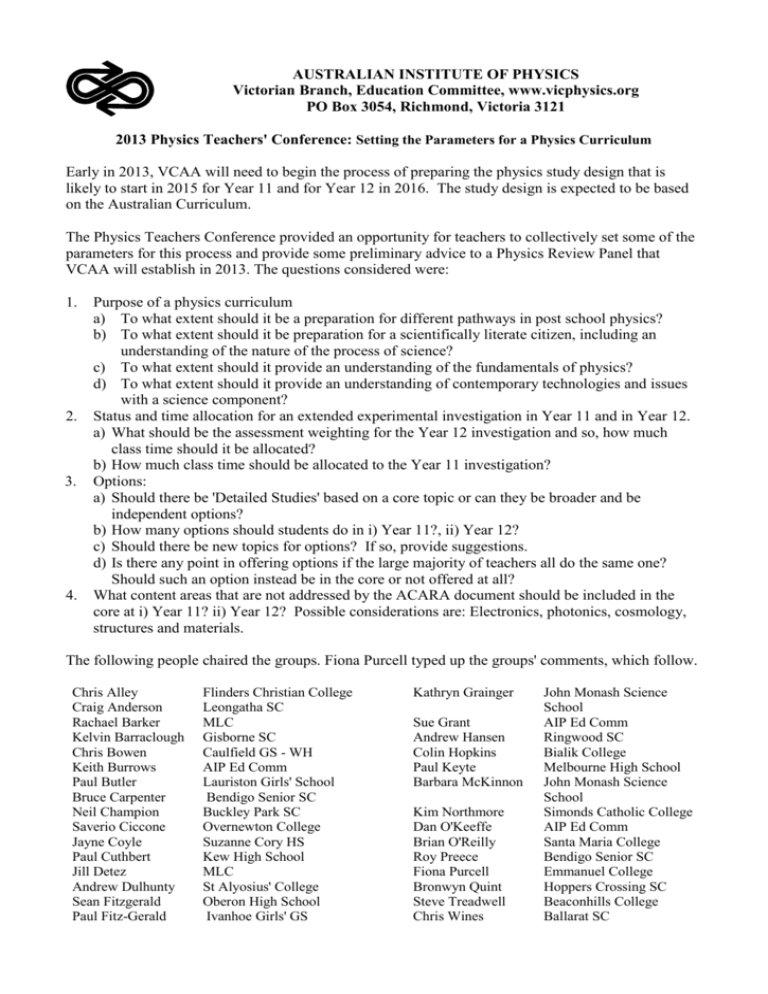
AUSTRALIAN INSTITUTE OF PHYSICS Victorian Branch, Education Committee, www.vicphysics.org PO Box 3054, Richmond, Victoria 3121 2013 Physics Teachers' Conference: Setting the Parameters for a Physics Curriculum Early in 2013, VCAA will need to begin the process of preparing the physics study design that is likely to start in 2015 for Year 11 and for Year 12 in 2016. The study design is expected to be based on the Australian Curriculum. The Physics Teachers Conference provided an opportunity for teachers to collectively set some of the parameters for this process and provide some preliminary advice to a Physics Review Panel that VCAA will establish in 2013. The questions considered were: 1. 2. 3. 4. Purpose of a physics curriculum a) To what extent should it be a preparation for different pathways in post school physics? b) To what extent should it be preparation for a scientifically literate citizen, including an understanding of the nature of the process of science? c) To what extent should it provide an understanding of the fundamentals of physics? d) To what extent should it provide an understanding of contemporary technologies and issues with a science component? Status and time allocation for an extended experimental investigation in Year 11 and in Year 12. a) What should be the assessment weighting for the Year 12 investigation and so, how much class time should it be allocated? b) How much class time should be allocated to the Year 11 investigation? Options: a) Should there be 'Detailed Studies' based on a core topic or can they be broader and be independent options? b) How many options should students do in i) Year 11?, ii) Year 12? c) Should there be new topics for options? If so, provide suggestions. d) Is there any point in offering options if the large majority of teachers all do the same one? Should such an option instead be in the core or not offered at all? What content areas that are not addressed by the ACARA document should be included in the core at i) Year 11? ii) Year 12? Possible considerations are: Electronics, photonics, cosmology, structures and materials. The following people chaired the groups. Fiona Purcell typed up the groups' comments, which follow. Chris Alley Craig Anderson Rachael Barker Kelvin Barraclough Chris Bowen Keith Burrows Paul Butler Bruce Carpenter Neil Champion Saverio Ciccone Jayne Coyle Paul Cuthbert Jill Detez Andrew Dulhunty Sean Fitzgerald Paul Fitz-Gerald Flinders Christian College Leongatha SC MLC Gisborne SC Caulfield GS - WH AIP Ed Comm Lauriston Girls' School Bendigo Senior SC Buckley Park SC Overnewton College Suzanne Cory HS Kew High School MLC St Alyosius' College Oberon High School Ivanhoe Girls' GS Kathryn Grainger Sue Grant Andrew Hansen Colin Hopkins Paul Keyte Barbara McKinnon Kim Northmore Dan O'Keeffe Brian O'Reilly Roy Preece Fiona Purcell Bronwyn Quint Steve Treadwell Chris Wines John Monash Science School AIP Ed Comm Ringwood SC Bialik College Melbourne High School John Monash Science School Simonds Catholic College AIP Ed Comm Santa Maria College Bendigo Senior SC Emmanuel College Hoppers Crossing SC Beaconhills College Ballarat SC Discussion Group Responses by table for each question 1. 1 2 3 4 5 6 7 9 10 11 12 13 14 15 17 18 19 20 21 22 23 24 25 26 27 28 29 30 31 ? ?? Purpose of a physics curriculum a) To what extent should it be a preparation for different pathways in post school physics? Vital to have a broad exposure to the many different areas of physics to allow the multiple pathways to be followed. Fundamentals – Motion, Photonics , light matter, Electromagnetism, generators, transmission Motivation in Year 10 presenting pathways to encourage more students to do physics. Yes Small proportion go on to study physics at University. To provide an understanding of the fundamentals of physics , enhance scientific literacy in students and link to both contemporary and historical technologies. Balance – year 11 general, Year 12 specific. Higher Ed XXX . But put life into it. Love of learning in physics. First must be INTERESTING!!! Connected to their lives. Interest vs preparation for university – students’ motivation in choosing year 11 physics especially. To make physics as relevant as possible. Definitely a pathway to university physics. Physics is not listed as a pre requisite to university. First year physics at Melbourne university is not a pre-requisite subject (content is year 12). DS's address this very effectively at present. Try to produce a curriculum that will draw more girls into physics. This will require more issues with a science component and a greater link to the applications of physics in everyday life. More focus on the scientific literate citizen and understanding of the fundamentals of physics (i.e points b) and c)). A major problem noted was the lack of good physics teaching in general science at middle junior school levels. “Literate citizens” least relevant. More about pathways. Because it’s post compulsory Needs to be accessible but retain core fundamental concepts. Since universities dictate prerequisites a physics curriculum is subject to their whims to ensure numbers are maintained in schools. Need to attract a wider range of students. How does this happen? What happens below year 11? Pathway for post school physics. Agree that should be a developmental step. Physics not being a pre-requisite has an impact on it being selected. Not only post school physics but as a lead to a wide range of university courses. Participants quoted several examples of physics used as a lead to pilots, music (sound) engineering etc. Pathway not pre-requisite of physics – lots of in-house catch up. Universities having schools for unprepared physics – vexed issue. VCE goes through to university primarily. Not expected by some university courses, no pre requisite content knowledge. Give abroad range of topics. Not many students at school now seem to want to go onto study physics post school. Engineering still popular. Pathway to university but also trade courses (electricians). Should cater for alternative pathways without burying students with calculations/mathematics. Flexibility the key. New course to cater for all abilities. Scientifically literate citizenship should be important. Year 7-10 science should do the bulk of teaching scientific literacy. Prepare them broadly for whatever pathway students take. University pre-requisite. Physics is often seen as an “option”. Mathematics is being taken out of school physics courses across Australia. Physics is being made easier. Physics needs to be a pre-requisite for university courses like engineering. IT is hurting physics. Do we include Physics and engineering post school pathway. Pre-requisite for science/electrical apprenticeships/TAFE courses/sport science. Specialisation – looking at specific areas of physics. Order of importance of a) – d). This was a Year 11/12 specialised group. Most preferred c) as priority one. Most – usually will go to university. Most want students inspired – a priority - want students to like their subject. Students not required to undertake physics at tertiary. Students have done minimum to enter science at tertiary level. Tertiary subjects will cover information in more detail. By the time students have chosen physics, likely to have career aspirations in science/engineering/technology. Not just educating potential physics graduates – much broader. Rather idealistic – probably year 12 students have already chosen. Students need to have a good basis to go into post school. There is a range of post school physics needs. Engineering directly, TAFE directly, other courses indirectly, courses. Do not “dumb down” the content. The course as it is, is pretty good and about right. Keep it broad so they get a taster of what is out there. Not at all – lets do it for the physics. There will be a course available after that. b) 1 2 3 4 5 6 9 10 11 12 13 14 15 17 18 19 20 21 22 23 24 25 26 27 28 29 30 31 ? ?? To what extent should it be preparation for a scientifically literate citizen, including an understanding of the nature of the process of science? Crucial inbuilt aspect. Should follow on and be built in years 7-10. Contextualise - connections to career pathways – there is a lack of up and coming engineers. Continue with Detailed studies which offer some pathway appropriate to post school eg. Nuclear physics which is not on the Australian Curriculum. b) Yes underlies year 7-10 curriculum as it is. Year 11 would be good place to start it is very important. There should be definite focus for a scientific literate citizen. The curriculum needs to be engaging and provide students with practical, real life experiences This needs to be all the way through the school starting in junior school. Science library. Science numeracy and presenting data. A major problem noted was the lack of good physics teaching in general science at middle junior school levels. Importance of year 12 for university entry will affect curriculum. Inclusion of more rigorous quantitative “mathematical” content for greater understanding of physics fundamentals. This would contribute to preparation for different pathways. Important but not paramount. A successful student in physics must be scientific literate. Scientific investigation is very important. More practicals are essential. Avoid dumbing down. Stick to what physics is. Mathematics content has been reduced – this leaves some areas untouched (angular , rates of change) g=10!! Eg. NPN transistor? Structures and materials. (b) is far more important than (a). Science process most important. Like to be able to cover the wide range of topics to cater for all levels of students. Pathway not pre-requisite of physics – lots of in-house catch up. Universities having schools for unprepared physics – vexed issue. (b) is really important. Should it be covered in years 7-10? Within confines of physics. The idea of “scientific literacy” should not be a big focus in VCE. Lots of year 11s in rural areas take physics because electrician apprenticeships require it. Instill love of learning physics (disagree completely with creating post school pathways). Fundamentals are essential, along with real life applications. We want physics to be engaging but not too shallow. Need to cater for students who want to do engineering, but it is primarily physics, not engineering. Get higher scores in other subjects (Health etc). Is required for basic scientific literacy. Basis for process of physics – Investigation/understanding/processes. Hope by end of year 10, students have basic literacy. Analytically literate – life skill (see examples below) enabling science – investigation work. Eg climate change discussion – average citizen needs to be more competent. Eg. Energy issue – resources etc…. economic question. Allowing teachers to bring their passion. Important – role and nature of science- need science literacy because many general public not informed. Problem with misinformation to be overcome. Suggest very important role also in years 7-10. Journalistic science is often not written by those with a science background – should have knowledge. Changing of careers means broad knowledge is better. Literacy and contemporary technologies should be covered more fully in units 1 & 2. Problem with removing materials and Structures, poor preparation for more traditional engineering. In UK have best students, but here have special needs doing VCE physics. Physics used to be a prerequisite but not as much now, so the amount of students doing physics is getting smaller. There is a range of post school physics needs. Engineering directly, TAFE directly, other courses indirectly, courses. 3.7, 4.4, 4.7,4.6 Should happen prior to VCE. All students need this. c) To what extent should it provide an understanding of the fundamentals of physics? 1 Need to focus on the fundamentals of physics in order for a) b) & d) to follow. 2 Concepts -- models - thinking -- formulas 4 c) Yes 5 Very important. Does not seem to be taught well in year 7-10 9 Clearly an understanding needs to be made. Teachers at year 10 need to be comfortable with teaching physics in order to build confidence going into senior school. Can we block science classes together in order to put experts in front of classes? 11 We should be producing critical thinkers with investigating/inquiring minds. 12 Perhaps “fundamentals” should be covered more deeply prior to year 11. 13 Important but not paramount. A successful student in physics must be scientific literate. Scientific investigation is very important. More practicals are essential. 14 Physics leads to current issues – is this in the course. Balance accessibility and rigour. 15 Science stems across all potential careers. Science shows how results are not always fixed, models changes. 17 May it not get too bogged down with technology and its use. Still need kids to think! 18 Most students choosing physics are expecting to follow a tertiary pathway but not particularly physics. 19 provide a broad range of topics should be a focus. 20 This is a given! That is the main purpose of physics to a great extent. 21 (a) and ( c) are kind of the same thing. Students who love physics will take it anyway. 23 Students often come out of physics thinking it is just kinematics and electricity. WE need to show them what physics is. Give them opportunities to see how physics is done in the real world. Links to things like CERN that could help scientific literacy. 24 Curriculum must be meaningful. Theoretical or applied. Things that can be applied are important → like structures & materials. 25 Basis for university/TAFE. Use ICT, Xcel, ipad , laptop, accelerometer, use of apps, data loggers. 26 Teaching rational thought. 27 Balwyn -110 students, many wanted score for law etc. Box Hill (night class) – do to help with university courses but still need scientific literacy. Chair still felt (b) very important. 28 Breadth of detailed studies (one already lost). Teaching to maximize their grade (high marks) →time restriction/limits of study design. 29 Literacy built in junior and middle years, perhaps senior years could focus on physics as a fundamental science. 30 Physics is good for all students to da as it opens their views on the world – so if too focused/advanced we might miss out some students. Physics needs to be contemporary but not to the extent of losing out on the fundamentals. (need a balance between ( c ) and (d)). 31 The fundamentals of physics are extremely important for common knowledge and to understand the physical world around us. ?? Lots. d) To what extent should it provide an understanding of contemporary technologies and issues with a science component? 1 Needs to be inclusive, eg medical. 2 Year 11 -- preparing for scientific thinking/literacy/experiments. Year 12—assuming pathways have been chosen in year 10ish. Greater emphasis in Middle years to promote “science”. · Many using the additional time to spend more time on “pracs”. 3 This should be implicit in the way the teachers deliver their course. • Best done in year 10. 4 d) Year 7-10 again 5 It should provide some. Relate to technology (computers ) in school. Detailed study more appropriate at year 11 than year 12? (More to be available at year 11). 7 a) Important !! but why? Junior years 7-10 more for scientific literacy. Leading students to questioning and researching. Need to develop XXX skills. Scientific thinking more rigour at VCE level. General scientific awareness need to be developed pre VCE. b) Fundamentals that should be taught: Energy 9 Contemporary career options need to be linked to a very clear roles post secondary and tertiary. Free up the curriculum to include space for developing interest in specific areas. 12 Contemporary technologies useful for engagement and context, but maybe could be school/teacher dependent. Contemporary technologies and issues change more frequently than curriculum. They could be outdated before a study design is superseded. 13 Important in context but less so in content. Use it to engage but too difficult to explain many contemporary technologies without the fundamentals of (c) already established. 14 Calculus at the level of rates of change. No CAS /graphics calculators. Scientific only. 15 Attracting students to physics. Students change career pathways every about every 5 years. 18 Conceptual understanding is important and good. Focus not on the mathematics. Need the contextual side and options. 19 provide a broad range of topics should be a focus. 20 To incorporate current issues/practices is important. It can allow those students who necessarily do not want to go to university. Physics for interest and links to real life. Have noticed difference between year 11 and 12 on this. 21 If you do (b) and ( c) → (a) is covered by default. Keep an eye on what they need for university pre requisites so as not to be disadvantaged is still important. 22 Yes need to be contextualized, meaningful for students. 23 Need a balance: Preparation for further courses but still need to encourage students who are taking it for interest. 24 Don’t want to teach a course that is “cramed” then super final. Fundamentals → should link in. 25 Yes. Need to reflect needs – explicit teaching time needed. 26 Not enough physics trained teachers in years 7 – 10. 27 (d) for 3 people – third choice. Communal –Lack of junior physics taught in schools. No heat topic a problem in curriculum? Reflection on the lack of background knowledge when students come to night classes. Reflects a lack of junior literacy. Questions as to whether (a) is ACARA’s priority. Have they also considered (c). Importance of physics training for junior science teachers. 28 High scores correlate to interest. Why do students select physics? – Pathways OR Marks. 29 Problem with (d) will be level of teacher expertise. Does (d) mean photonics?, LHC ? computational physics and modeling involved with climate science or astrophysics. 30 It needs to be about being engaging for the students. Curriculum need to be engaging young people of today’s society. 31 Contemporary technologies are needed to be understood E.g. How does your mobile phone send a signal? Etc ?? Should happen prior to VCE. All students need this. 5. Status and time allocation for an extended experimental investigation in Year 11 and in Year 12. a) What should be the assessment weighting for the Year 12 investigation and so, how much class time should it be allocated? 1 2a) Assessment. Half of the outcome. Time 1 week. 2 3 4 5 6 7 Year 12 EPI . 2 weeks minimum. 20% of overall. Evidence based. Summary of smaller practicals. 10 in group. Status ; Most say it should exist in year 12. General agreement that an EPI should exist in year 11. Year 12 - 8-10 hours (once per year). Year 11 - Similar to year 12. There is a lot of support for the investigation in Victoria. The pressure of study scores is hampering the effectiveness of an EPI. “safe” options tend to be chosen over learning opportunities. 2 – 3 weeks at Year 12 up to 4 weeks at year 11. 20 – 25% weighting for practical investigations. Exam 50%. Practical 25%. SAC 25%. A quarter of classtime allocated to pracs (2 weeks for EPI) Some people there should NOT be an EPI at year 12. Practical wish of a big EPI ?? 10 Weighting range from 50/50 to 100%. Time allocation 1 week – 3 weeks. Very valuable exercise to develop enquiry and analytical skills. 11 EPI weighting at year 12 is too high. As an assessment it takes a lot of time for its score value. 12 Approximately 1 week – 1½ weeks (maximum 2 weeks). Good preparation for university. Need more experience in investigation at year 11. Something close to CATS could come back – need more physics background first. Maybe unit 4. 13 More EPIs . 2 in year 12 . 2 in year 11. Year 12 (?) Increasing complexity and decreasing support structure. The EPI concept should be introduced earlier. (years 10 & 11). Make the EPI examinable? More focus on exam questions to practical investigations 14 Yes to year 11 EPI as preparation for year 12. Below year 11 practical work is recipe driven. Need to design open ended practicals in general science. Yes to year 12 EPI. Currently structured by teacher. Need guidance from teacher but not recipe driven. 15 Year 12 EPI. Very important to incorporate EPIs into coursework. Analysis of results is poor among students. Making decisions, modifications in practicals need to improve. Managing a research and design approach in a class of 25. Students find it puts them out of comfort zone instead of knowledge content base. Look at 3 variables in year 12. The mark is a minor part the overall mark. Weighting of it does it need to change?? 17 EPI. Not general agreement about the time used for EPI and the importance it is given. Some felt the students did not get a great benefit from its inclusion. Some felt that more topics could be included or others expanded to use the time. 18 What about 2 EPIs at year 12. This is real physics and a lot of effort goes into it. Recognition into what research is. Actually have a top SACs EPI to showcase the real research. Schools select SACs that meet a criteria to be put up for top SACs. Classtime - over a fortnight preparation time and then actual experiment. EPI needs to be kept and made time for. 19 EPI spend 1- 1½ weeks , about 5-6 hours. New study design gives more time this year. Would like to do 2 practical investigations extended to more than one topic. Suggestion of port- folio option. 10% of unit value placing more emphasis on the practical investigation. 20 Year 12. More flexible. Depends on content. A lesson beforehand to plan and prepare. Give them a week to collect data and analyse. Another week to write up and come up with finished product. 4 hours for teaching. 21 Year 12. Approximately 2 weeks of class time taken by all. One person spent a whole term on EPI.!! 9% weighting is appropriate weighting for the EPI. a) What should be the assessment weighting for the Year 12 investigation and so, how much class time should it be allocated? Ctd 22 Need an EPI , strongly in favour. EPI → Year12 → 10% → 2-3 weeks. 23 24 25 26 27 28 29 30 31 ? ?? Investigation is very important for students’ skills and literacy. Perhaps increase the weighting for year 12 investigation. This will make teachers take it more seriously. Currently the exam takes priority in terms of their end of year results. Good at year 11. Time to do it. To “teach” physics not exam. Investigation needs to be moderated against the exam. Can become cynical and do easy investigation to tick the box. Time for allocation. How can you enforce this? How do you cover all areas in an EPI? 30%. Time allocation. Good detailed study taken out. Year 12 class time term 4 taken out for practical. 1½ - 2 weeks at most. EPI is a good length. Long EPI good in theory, logistics too hard. EPI weighting – current model good. Chair suggests that quality of task. Melbourne High each area detailed study practical ⅓ and theory ⅓. Physics a practical subject hence the above. Assessment set over 2 weeks year 12. Year 11 similar. Investigation –school assessed XXX. 40/70 for practical for SAC. Should there be an official criterion sheet as for studio arts?? Others feel it is unrealistic. Problem cut cloth according to resources and quality of students and also lab support. Sense of scientific inquiry. Agree that it is useful to complete the process. Timelines are difficult. Need to build skill to complete task. All agree that it is valuable. Currently a range of time allocation from 3 hours →2 weeks at year 11. At year 12 ranges from 4 hours → 9 hours. Time allocated needs to be weighted on marks allocated. Assessment will ultimately lead content. Therefore physics practicals will suffer at expense of theory. Recommendation of a practical exam – externally assessed. To be physicist there needs to be an investigator (so need investigations). Need to have commonality of assessment and be consistent. Recognising in the curriculum the time aspect. Students need these skills so as not to be spoon fed by teachers. Students can use their planning skills and their imagination to complete the task. It fully promotes thinking and many other organization skills. Their ability for planning and knowledge is limited but needs fostering. Some group members have the practical investigation as the assessment for a whole topic while others use a mixture of 50% assessment for EPI and Structures is also popular. Include a checklist for authentication for use by teachers . Most time students should be given in year 11 so students know how to do a student designed practical. Therefore it will need less time in year 12. In terms of marks, all school based assessment is subjective and most kids get “A” so I wouldn’t give it much status at year12. b) How much class time should be allocated to the Year 11 investigation? 1 2b) Year11. 1 week plus 2 weeks in preparation (smaller practicals / investigations) 2 3 4 5 6 7 Year 11.Development of experimental skill. Teacher directed leading toward independence. At least 2 weeks (mimic yr12) Year 12 - 8-10 hours (once per year). Year 11 - Similar to year 12. Still like to retain school assessment apart from EPI. External v’s internal ; 60%, 40% or 2/3 , 1/3 is still preferred. Year 11 - 2 weeks each semester. Assessment could be just S or N. This would aid students to take more risks. If assessed it needs to be more than 25% so students see it worthwhile. Otherwise students may put time and effort elsewhere. If weighting is high for the EPI some of the content needs to be removed. Less time in year 11 because of 2 detailed studies. Would like more time for practicals in year 11. Year 11 EPI same amount of time Year 12. About 2 weeks (7 – 10 lessons) for the EPI. The same or more as year 11. 9 Do something similar at year 11. Similar to year 12 (3-4 weeks). 10 Possibly need more direction for students re 9and with limits on equipment) choices. Girls can find the process too vague and uncertain. In the group year 11 have 1 – 2 investigations. 11 Year 11 needs a unit on experimental design and presentation of experimental data. 12 Needs more structure around its operational delivery. Structured more at year 12. More support at year 11. 13 Weighting is flexible between schools so is allocated classtime. Give more time to year 11. Link/extend year 11 investigations into year 12. 14 One in depth EPI over 2 weeks. Specifications needed to get more uniformity across schools and maintain flexibility. Could be managed across the whole year. 15 Year 11 EPI. Look at 2 variables in year 11. Overall very important part. Year 11 more time to allocate EPI. 17 More choice of topics to experiment on. In part, student design was a problem as inappropriate choices were made. Year 11 could be a good place to have a student designed and guided experiment. 18 Authentication may need observing, practical work to be done in class. Should the write up be run in class. EPI must be there to reflect what real science and physics is about. 19 Generally More practical work is done in year 11. Time pressures make it harder at year 12. In year 11 at least 1½ to 2 times more practical exercises done. 20 Year 11. Similar to year 12. Use the detail studies for EPI. Practice with large amounts of data in preparation for year 12. 21 Year 11. More time for structured experimental work throughout year 11 so students can learn to think and analyse. Time for self- directed investigation to prepare for year 12. Perhaps a requirement for a certain numbers of hours of practical work in year 11. Flight investigation or Alternative Energy sources (self-directed) provide a useful way of preparing students for the year 12 EPI. EAL students often have very strong backgrounds in mathematics and physics →Lots of time goes into supporting language → what’s more important? Keep an eye out for EAL students. 22 Need an EPI , strongly in favour. EPI → Year12 → 10% → 2-3 weeks. 23 Year 12 – Time taken about 2 weeks. 8-10 hours of classtime. At year 11 – 5-6 hours (1 week). Maybe get them to do 2 investigations, to help prepare for year 12. b) How much class time should be allocated to the Year 11 investigation? 24 Suggested weighting??? Have to know students – will do well on EPI. Got to have EPI but people are saying “cheat”. Weighting no more than ??? Let students have a say in the weighting? 100 marks school based course work. Weighting same as it is now →it is necessary. 25 Year 11 more hands on. Let students “play” so year 12 crunch time. Reflective of year 12 class. 26 5 periods – testing analysis. 2 periods – write up. 10 - 15 % grading. 27 Assessment weighting? Melbourne High, EPI 2/3 of 40 marks = practical. Of complete SAC mark – out of 100. Should EPI 20% - unanimous. Year 12 Investigation classtime - 7 hours practical. Discussion How much can be written up at home? DO schools have time/resources to do it in class? Eg computers. Should EPI be done in class? As a result need to be done outside class time. Melbourne High – 7 hours practical time for year 12. Write up out of class as no time. Year 11 Melbourne High doing 6 hours practical. 28 Can learn about topics not in the textbook. Reasonable amount for it to be included in school based assessment. 2 weeks spent on average on task each semester. Year 11 allows more time to be spent on task. 29 Currently EPI is a necessary “evil” many schools weighting of EPI falls. Concern over weighting of a practical tasks, if no external assessment will skew student rankings. Methods of delivery of EPI ranges from open choice, to choose from a list, often decision led by difficulty of correction – single practical – structured outcome. Question implementation of practical questions in final assessment – online video 30 In the “old days” there was more specifics and clear (not airy fairy). For year 12 and similar year 11 time allocation 8-10 hours. (If we are saying this then the greater weighting in SACs should be on this. Different marks depending on detailed study). 31 EPI is hard in year 11 because they don’t know too much. On the other hand it is important for them to design the EPI in practice for year 12. More variables can be explored in year 11 if you have more time. Semester 2 is better in year 11 for EPI because they have grown a physics brain. ? School designed investigations are preferred by staff and students. Allow a little more time for this (2-4 weeks). 3. Options: a) Should there be 'Detailed Studies' based on a core topic or can they be broader and be independent options? 1 Detailed studies currently lead from the core course content. Detailed studies need to follow from the course otherwise students will need to be skilled up again in the new areas. Detailed studies should be an extension of the core topics. 2 We like to be able to choose our detailed study. 3 Detailed studies with more independent option 4 Detailed studies are not student options at most schools , it’s decided by the teacher. But all agreed that a detailed study /option is good. – specific to schools with poorer language skills, prior interests, career aspirations. All agree we should keep EPI - prep for university ; reports, indepth thought. Also year 11 practical investigation is good preparation and good teaching of skills. Detailed studies should be linked with the course. If options are provided these must be equitable. Desirable to cater for student interests. If run scope for catering to students/schools etc. Flexibility for options for courses. - Concern examinable material should be at similar level across detailed studies. Detailed study are good. 5 6 7 9 The popularity of some options indicates that the extent of alignment with the core influences teachers’ choice. There was a large range of detailed studies taught at this table. What was a concern was that a quarter of teachers expressed that they were teaching a detailed study that wasn’t their choice but a senior colleague imposed. 10 Problem identified as the options often show different levels of performances. The detailed studies need to be moderated. 11 Choose 4 detailed studies and these are rotated through year 11 and 12. 12 Detailed studies to go deeper but under pressure of performance in year 12. The outcomes and key knowledge are not matched. 13 Detailed studies give students a variety of options. Make the detail studies relevant to the topic the student study. 14 Choice is good to reflect a teacher’s strengths/interests. Aim for detailed study options being equivalent in difficulty. 15 Teacher choice or student choice of topic. Teachers choose on knowledge basis or whether they want a new option after having taught previous topics year after year. 17 Keeping detailed studies/options/?/? Whatever they may be called in the future seems an ideal way of allowing the course to cater for the wide range of students who take physics as a means to an end or a lead to further physics studies. 18 Resources are always limiting to having option enable use of equipment in school. Giving students the choice is very valuable to empower the students and push them further. 19 Broad options good – keep the course fresh, gives the ability to make an interesting, engaging course for students. It is easier and more time efficient if the options are linked to the core. Linking to the core is good because fundamental knowledge is already covered. None of the teachers would let the students choose the detailed study. Although this has been trialled. Consensus - detailed studies are enjoyable and engaging for students. It would be a shame to lose them. a) Should there be 'Detailed Studies' based on a core topic or can they be broader and be independent options? ctd 20 YES!! Maybe some should be core eg structures & materials. Many are already linked to core, are an extension. Existing ones have flexibility, especially year 11. Currently cater for varying abilities. If put in core , what will some kids do??? Consensus : leave as they are for year 12. Maybe more independent options at year 11?? 21 Detailed study is good. They link quite well to the core. Allows pursuit of personal interests . Current requirements are great. Year 12 – 1 Detailed study and year 11 – 2 detailed studies. 22 Yes 1 or 2 23 If only one detailed study at year 12, have fewer options: Perhaps 3 options. It would be easier to make sure they are of an equal standard. 24 Love detailed studies. We want them. Broaden. 25 Victoria used to having that choice. Teacher enjoyment, student enjoyment. Like 1 detailed study in year 12, rather than 2. One less topic and more time, one less exam more time – good for understanding. Detailed studies are quick exposure – perhaps extend? NSW – 3 core, 1 elective. Victoria should be 3 and 2 detailed studies? Like detailed study reinforce the core eg photonics, interactions light & matter and other subjects. 26 Detailed studies to relate to real life situations more eg heating and cooling. 27 Broader and independent 28 All agree Detailed studies are a great thing. Allows for flexibility/choice. 29 In general students choose a detailed study and teach that. The general consensus is that detailed studies should be included as they provide choice for teachers and sometimes students. 30 76-78% are teaching sound still, even though it is not a core topic now. People just keep teaching the same practicals, content etc. Year 11 having the course related to core or being independent doesn’t matter. Flexibility and broader widens students views. Year 12 have it related to core helps with fluency and reinforcing the core. 31 It can be an advantage to reinforce other core topics. Some can also stand alone. Most topics are related to some core anyway. Both independent or core related is OK. ? Have the option of both core and independent options. ?? Detailed study seems a misnomer. Needs to be given the time to go into detail. Having said this it should be stand alone. Allowing teachers to customize class to interest of the kids. b) How many options should students do in i) Year 11?, ii) Year 12? 1 10 Year 11- 2 and year 12- 2. Year 12 prefer 2 Detailed studies as this allows students to learn more physics and this links to Q1. Year 12 – One Detailed study. One of five dependent on content of core. Year 11 - 2. Year 12 - 2 if 1 is an EPI (by choice) Parts of Australian curriculum such as relativity, quantum could be options for detailed studies. Some dot points have gone and appear in 7-10 curriculum. OK if it is done well?? Are they done to an appropriate level. Teachers like doing 2 at both 11 and 12. Teachers are picking detailed studies based on which seem to get the best results. Moderation of exam results across each detailed study. Year 11 - 2. Year 12 - 1 As in a) above Detailed studies shouldn’t have to be linked to the core studies that semester – keep choices of unrelated topics as well. Possibly more to extended answers for the detailed studies. 11 Year 11 more option based than year 12. 12 Detailed studies are not equally examined. Some detailed studies are easier than others. 13 Should have stuck with 2 detailed studies in year 12. 14 19 Detailed study options should start from core and extend. Structures and materials does not do this. Should it be student choice? Detailed study options need to be structured to support this. Master class approach. Detailed study is an explicit extension of the core. Year 11 2 detailed studies. Year 12 1 detailed study. Having only 1 topic decreases the breadth of physics content. One detailed study for year 12 is OK. New topic to re-include Thermal Physics. A feeling from a couple of people that aviation students might like an extension in year 12. Enable teachers with specialties to use them and engender that sense of love with the student. Exam will dictate what we teach. Year 11 – 2 and year 12 – 1. 20 No change to both. 21 22 23 Perhaps with a single exam, we may have relief from time pressure and 2 detailed studies in year 11, 2 will be ok. Could allow students more choice on exams. 1 or 2 Could have a “physics” option an “engineering” option and one that is a mixture. 24 I like what is offered now. Must be limited to choosing from a few. 25 26 Happy with the year 11 and 12 structure. Teachers teach detailed study to their strengths. 27 Year 11 option – do one per semester. Year 12 do one (lose most of term 4) 28 29 Materials and Structures fits nicely into core as an extension to forces work. It is useful if detailed studies have links to the core, but it is great to have quite broad detailed options. It is easier if year 11 detailed studies are less related to core (as they currently are) and more closely linked in year 12. Year 12 – only doing one, gives more time on topics. Year 11 – we like the 2 detailed studies but we have concerns about how we will fit it all in with the national curriculum. (time) Year 11 – 2 options. Year 12 – 1 option. Is fine. As many options as you like in year 11. No options in year 12 needs a consistent curriculum. 2 3 4 5 6 7 9 15 17 18 30 31 ?? c) Should there be new topics for options? If so, provide suggestions. 1 If there is to be only 1 at year 12 consider adding into year 11. We are aware how full the year 11 course is so we may not be able to give more choice at year 11. 2 Year 11 – Two. Two of five . Sound as core. 3 Investigation, heat. 4 If we lose internal assessment!! Death of practicals and investigations?? 5 6 Teachers are encouraged to do two main options due to exam result – is there a need for other options? Astronomy (at year 12 instead of year 11). Options should be more modern based, relevant to current /present day issues/techs etc. 7 Thermodynamics, biomechanics, meteorology, fluid mechanics, semiconductors Year 11 – choosing 2 of 6 currently, this is great. Strong feeling that some choice is essential. Detailed studies are an opportunity to connect with modern technology and careers and we don’t want to lose this. 10 Choose 4 detailed studies and these are rotated through year 11 and 12. 9 11 If year 12 is about tertiary entrance, then year 11 should be about engagement and enjoyment of physics. 12 Optional topics should be in detailed studies such as relativity. 13 No. 14 Examples – Standard model (instead of core), Astrophysics, Thermodynamics, Optical instruments, Global warming/climate change 15 New topics; Materials science, climate change, telecommunications, thermodynamics. 17 In year 12. The removal of mid -year and one detailed study has made more time for experimental work. 18 Thermo as an option. Don’t lose astronomy/astrophysics. 19 New topics suggestions; Physics of sport (theme), Climatology/atmospheric science. 20 Heating and cooling for year 11. 21 Synchrotron not appropriate for country schools. Heat at year 11 or 12. 22 Yes 23 It would be easier to make the detailed studies assessed fairly (similar difficulty) if it wasn’t just multiple choice. Need to be able to have short answer and calculation questions. 24 2 for year 11. Atmospheric science a possibility. 25 Options. Atmospheric physics & climate change. Climate physics. Seismology. Superconductivity (add to). History of physics. Science movies/sci fi. Sport science. Physics myths 27 Yes utilize specialties of teachers. Should be more choice?? 28 Numbers to study; Year 11 – 2 and year 12 – 2. 29 Having one detailed study out of 4 options would be good. Two detailed studies at year 11 out of 6 options would be good. Possible options: climate change, engineering materials. 30 Synchrotron missing but the content falls into electromagnetism in one of the core topics. 31 Year 11 - Geometric optics could return. (Ray tracing). Year 12 Molecular Physics and thermodynamics could be introduced. Year 11 Floating and hydrostatics using forces could be engaging and simple. Year 11 Simple machines with gearing could be an option. ? Heat may be something to put in as an option. d) Is there any point in offering options if the large majority of teachers all do the same one? Should such an option instead be in the core or not offered at all? 1 Keep all options available, caters to a wide range of student and teacher interest. 4 6 All agree we should keep EPI - prep for university ; reports, indepth thought. Also year 11 practical investigation is good preparation and good teaching of skills. Yes – options are desirable. 7 Current structure – Year 11 – 2 and year 12 – 1. Depends on Australian curriculum. 9 Climate (heat?) /technology 11 All the stuff that has been pulled out of year 12. 12 Australian curriculum have removed some fundamental mechanics such as circular motion in a vertical circle, simple harmonic motion etc. 13 Each teacher tailor it to the equipment that is available. 14 Must be accessible/assessable. Teachers need support. Include explain/calculate questions. 15 Less options available for only one exam. Research what is being selected at the moment. Sound should it be in the core? 18 One suggestion year 11 - 3 go to 2 and year 12 - 2 stay 2. 19 There is a broad range of detailed studies undertaken by teachers currently. 20 No change in offering options BUT marks for less popular options are lower than sound and materials & structures so some moderation of these is needed. Leave popular sound and materials & structures for students to have as “easier” option but moderate marks for “harder” eg further electronics. Multiple detailed studies at year 12. No one does it because we’ve got to prepare the kids equally for the exam. Also increased workload. With single exam situation may change? 21 Definitely still keep options (to allow for student interest). 22 Should offer a selection to offer variation. 24 Maybe some detailed studies from year 11 to year 12. Sound in year 11. 25 Yes. Take out, big picture gets lost. Tweaking is good. Worked hard to make enjoyable eg transistor theory. Student choices is great – valued by students. 27 Options – shouldn’t be part of core. 28 Numbers to study; Year 11 – 2 and year 12 – 2. 29 Including options allow more content to be included in the course so it is good to include. 30 If teachers have already taught a topic many times they want eh best for the students and so the same practicals, content etc so the students do the best in the exam. Also teachers are time poor so don’t have enough time to research and find new content , resources, practicals to do on another topic. Therefore to just have one detailed study would not be a good thing, keep many options. 31 Having options is great and teacher expertise can come into play. Access to equipment and universities is also a factor. ? Better to keep the option open and not force ~ 20% of students to change. The options are a good way to go. Keep them. 4. 1 2 3 4 5 7 9 10 11 12 13 14 15 17 18 19 20 21 22 23 24 25 26 27 28 29 ?? What content areas that are not addressed by the ACARA document should be included in the core at i) Year 11? ii) Year 12? Possible considerations are: Electronics, photonics, cosmology, structures and materials. It will cause less engagement of students, due to lack of pathways and relevance. Numbers will drop and are already low. Course content of Unit 4 does not support Q1. The course does not logically flow, eg AC out but generators in. Teachers will have to teach the gaps and so the amount of content will be increased significantly from that documented. Year 12. Photonics retain. Particle Physics ? Structures and materials (Increase the amount of prerequisite material for engineering). AC voltage, generation without AC ?? If teaching sound, should have intensity etc. Materials cut are key to engineering and medicine. If no dissatisfaction in Victoria course, why change? Good content removed historically based upon time factor. Reduced “mathematic” content. “20” concepts less in Australian curriculum. Content driven, reduced practical emphasis. Motion of charged particles in magnetic fields? Some electronics? Keep in mind unpopularity of some detailed studies when considering what is compulsory at year 11 and especially year 12. Some concern about specialist knowledge required at year 12 level especially re cosmology. Please argue for some photonics. Year 11 - pressure. Synchrotron (especially since we have one). Data transmission technologies. “engineering” Properties of materials. Mixed responses whether it is core physics or not. Light and Vision-Very good idea it is back. Why total internal reflection in but not critical angle? Put astrophysics back in. Flesh out optics. Add – Semicondutors, Nuclear fission/fusion, Astrophysics, Photon momentum. Light and Vision. Ray tracing, Critical Angle , Thin film interference - IN Photonics – A feeling that we should have more about how components work. Why is vector components missing from Australian curriculum?? Pressure, Bouyancy (Fluid mechanics) is missing from Aust Curr Electronics - so much missing. Need a dedicated website to give support to new content. Materials – offers students an insight into Engineering (which is of interest to a lot of students). Also involves a great practical component. All is really important. AC voltage should be included to lead to generator and transformers. Vector components should be included to prepare for projectile motion and motion in general. Fluid mechanics as an option for Queensland. Happy with the addition of heat. Many aspects of topics that are still included have been removed (which seems silly). Eg Nuclear energy but no decay chains, Light and vision but no colour. General impression is that lots has been removed and not much added. Options. Relativity, Thermal Physics, Quantum (Bohr, Compton), Sound, Astrophysics. Capacitors need to be in the course. Very worried about the reduction of electricity and electronics and photonics. Should keep in radiation dose and fusion reactions. Thermal physics not so relevant, keep in Yrs 7-10. A bit boring. Important to keep a balance of qualitative and quantitative questions. Not too far either way. Capacitors, Temperature scales, Insulation, Astrophysics, Sound , – All in a detailed study. Relativity , Atomic – OUT Name change for gravity. How far with mathematics equations needed for special relativity and quantum theory. We need options. Standard model →option/detailed study Consider 1 or 2 options in unit 4. DC motors, AC voltage, Ploss = I2R. “Torque” part of core in mechanics. Apparent weightlessness – keep in motion core. ACARA proposal seems to be cutting back to physics basics and cutting out options/depth/extensions. Keep DC motors in electricity. Why is proper time and length not included? Good to have heat included. Questions re nuclear following should be IN, dosage & radiation risk, decay chains, fission reactor, CT, MRI, PET, Radioactive , Plank’s hypothesis, photon momentum, lasers. Optional units are a good way to cover a large variety of topics. Electric charge could/should be taught as a fundamental to electricity. Electronics not included in AC →very important part of modern world. Ipods etc. May need to put in a detailed study as we won’t be able to fit it all in the core work. Geophysics? – mining boom!

